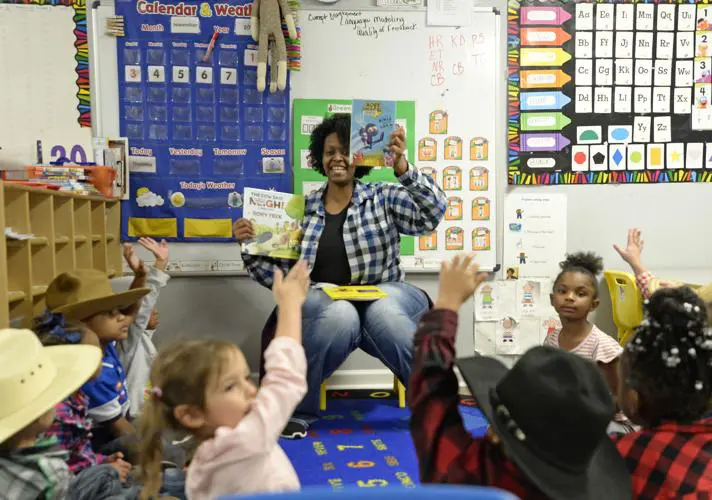
Your tax diversion could fund Lafayette Parish pre-K curriculums
Photo caption: Jacelyn Rideaux lets her students choose a book to read on Friday, Nov. 19, 2019 at Christina’s Learning Center in Duson, Louisiana. Photo by Brad Bowie.
By Katie Gagliano
It’s the season of giving and Lafayette’s On Track by 5 Alliance is urging local businesses to give their tax dollars to support early childhood centers.
Businesses can donate up to $5,000 of their tax liability to On Track by 5 and receive a dollar-for-dollar credit on their state taxes. The tax diversion is made possible through the Child Care Resource and Referral Tax Credit under the state’s larger School Readiness Tax Credits program.
Nonprofits and business entities with no tax liability can still donate to the program and receive a dollar-for-dollar refund from the state.
Michelle Mahne, marketing specialist for On Track by 5, spends her time promoting the program to local businesses and raising awareness about the tax credit option. The specialist’s goal is to add 30 new businesses to On Track by 5’s support roster by Dec. 31, the deadline for the tax credit program.
“With the money we can only purchase curriculums, training materials — things that will impact and improve early care and provide high quality experiences for Lafayette Parish children,” she said.
The goal is to purchase curriculums for every infant, toddler and pre-K programs at the parish’s 41 publicly funded early learning centers. The price tag is about $150,000, Mahne said.
On Track by 5 is one of seven child care resource and referrals agencies in the state and the only agency that serves a single parish as a subset of a school district. Despite its close relationship with the Lafayette Parish school system, On Track by 5 has a separate budget, Mahne said.
In 2012, the Louisiana Legislature passed Act 3, or the Early Childhood Education Act, a set of reforms that changed how early child care in Louisiana is organized, assessed and supported.
Major changes included moving all publicly funded centers under the oversight of the Louisiana Department of Education, establishing learning and achievement standards, and requiring all lead teachers to have an ancillary teaching certificate by 2019 or be in the process of earning one.
The alliance helps Type III child care centers meet state requirements and educates families about their early childhood care options. Type III child care centers accept public funding, usually through subsidized tuition based on the family’s income and parents’ work and school status.
Mahne said she believes “education is economics for tomorrow” and can help boost at-risk children facing more barriers to educational attainment.
“How are we going to change Louisiana and move up from 48th, 49th, 50th in education? Everyone else invests in early care and that’s what we have to do to move up,” Mahne said.
Christina Henry, owner of Christina Learning Center in Duson, said On Track by 5’s guidance has been invaluable to the success of her center over the last three years.
The director said it’s challenging to find resources and guidance from other early childhood directors in the competitive market. On Track by 5 director Paula Granger and her staff supplemented her research and provided insight on how to structure her center, implement curriculums and manage changing regulations, Henry said.
The early learning center owner said On Track by 5 provides resources and expensive curriculum materials center owners might not be able to afford otherwise. Having access to those resources is crucial to providing quality care to the young children at her center, Henry said.
Learning starts at birth and more attention needs to be paid to early education, she said.
“I don’t think people are seeing and understanding what we do. We’re not here to babysit the kids. There’s a lot that goes into making sure these kids are safe and that they’re learning,” Henry said.
There’s typically a clear difference between children who’ve spent time in an early childhood center and those who haven’t, she said. The director said she notices the children who’ve only been in a babysitter’s care have more trouble self-regulating and experience strain under routines.
Once, a 2-year-old twin girl was almost nonverbal because her parents didn’t know how to prompt her development. Within a month, she was talking. Seeing the children’s social, emotional and academic growth is special, Henry said.
“Seeing them grow into the little adults they’re becoming is so rewarding,” she said.
Todd Mouton, executive director of the Pugh Family Foundation, said participating in the tax credit program should be a no-brainer for businesses and nonprofits with the means. The foundation he manages has participated for at least the past five years, both making donations by electing to file taxes and by sponsoring Mahne’s position with grant funding, Mouton said.
It’s a low-effort way to make a difference, he said.
“It’s like so many things in life where it seems complicated, but it really isn’t,” Mouton said.
Taxpayers have limited discretion in how their tax dollars are directed, but this is one way for businesses to have a say and make a tangible change in the community. Education is one of the most powerful tools to uplift people, and investment in early childhood care is one way the community can help prevent achievement gaps before they happen, he said. “All the research says that brain development happens early and starting kindergarten on time is the way to give children every advantage possible,” Mouton said. “Educational attainment is a cumulative process that’s easier to fix on the front end. If you fix the trajectory earlier, it’s easier to stay on the path and hit the target.”
